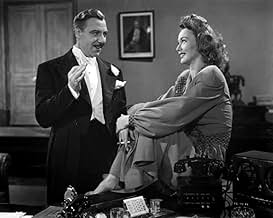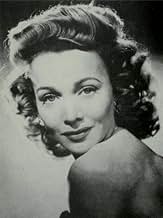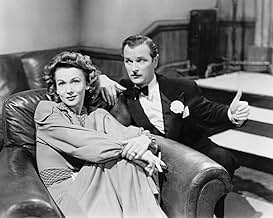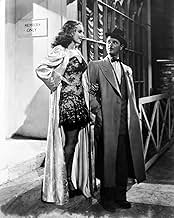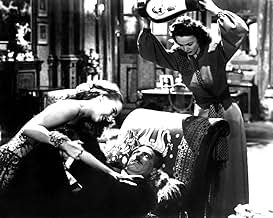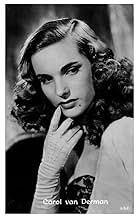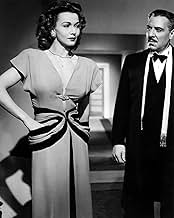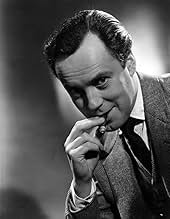In post- WW2 Britain, an American fashion journalist, her ex-army fiancé, and a gang of honest toughs from a local gym attempt to bring black market organized crime to justice.In post- WW2 Britain, an American fashion journalist, her ex-army fiancé, and a gang of honest toughs from a local gym attempt to bring black market organized crime to justice.In post- WW2 Britain, an American fashion journalist, her ex-army fiancé, and a gang of honest toughs from a local gym attempt to bring black market organized crime to justice.
Carol van Derman
- Mercia Lane
- (as Carol Van Derman)
- Director
- Writer
- All cast & crew
- Production, box office & more at IMDbPro
6.1463
1
2
3
4
5
6
7
8
9
10
Featured reviews
Carole Landis in a British film
The Silk Noose, or Noose, as it is also known, from 1948 is a British film starring Carole Landis as a fashion writer for a newspaper.
It's post-war Britain, and despite the war being over, there are many items that are hard to get. An Italian black market racketeer, Sugiani (Calleia) runs an operation in black market goods. So far, the police haven't been able to get them.
A fashion writer, Linda Medbury (Landis), is determined to bring down the gang, although her publisher would rather she stick to clothes. The front for the group, The Blue Moon Club, winds up with a corpse, which sends Linda's reporter tentacles high.
Linda finds herself in danger as does her source. Her fiance is determined to protect her and bring down Sugiani at the same time. It won't be easy.
Sometimes this film seemed like a comedy, particularly with the rapid fire dialogue of Nigel Patrick as a cohort of Sugiani's, and a woman losing her dress toward the end of the film. The last twenty or so minutes has a lot of action.
This was the beautiful Landis' second-last film. What a waste of talent. She gives a vivacious, likeable performance here. Unfortunately, her career fell on hard times when she ended her relationship with Darryl F. Zanuck. Unhappy with her career and misguided in her search for love, she committed suicide. Life in Hollywood for a woman was always extremely difficult, and she was one of its victims.
It's post-war Britain, and despite the war being over, there are many items that are hard to get. An Italian black market racketeer, Sugiani (Calleia) runs an operation in black market goods. So far, the police haven't been able to get them.
A fashion writer, Linda Medbury (Landis), is determined to bring down the gang, although her publisher would rather she stick to clothes. The front for the group, The Blue Moon Club, winds up with a corpse, which sends Linda's reporter tentacles high.
Linda finds herself in danger as does her source. Her fiance is determined to protect her and bring down Sugiani at the same time. It won't be easy.
Sometimes this film seemed like a comedy, particularly with the rapid fire dialogue of Nigel Patrick as a cohort of Sugiani's, and a woman losing her dress toward the end of the film. The last twenty or so minutes has a lot of action.
This was the beautiful Landis' second-last film. What a waste of talent. She gives a vivacious, likeable performance here. Unfortunately, her career fell on hard times when she ended her relationship with Darryl F. Zanuck. Unhappy with her career and misguided in her search for love, she committed suicide. Life in Hollywood for a woman was always extremely difficult, and she was one of its victims.
Ahead of its time in some ways, but the execution is rather pedestrian
NOOSE is a well-plotted but oddly uninspiring little crime film which deals with efforts to bring down an Italian black market racketeer operating in London following WW2. His sheer breadth of power means that the authorities are powerless against him, until a lone female reporter decides to write a scoop that brings him out of the woodwork and up against her.
There's some great material in the narrative here, including a completely amoral villain who enjoys using knuckle dusters to beat up women! The stark gang violence makes ahead of its time, but it's a pity that the execution is less than stellar. The film plods when it should grip, and it only really gets going in the last twenty minutes or so, with an unusual and rather powerful climax. It's one of those rare films where the women are both empowered and sexualised, leaving the men looking weak by comparison.
The tragic Carole Landis stars in her penultimate acting role before her untimely suicide and very good she is too: bright, brassy, and running rings around the menfolk. Joseph Calleia and Derek Farr are rather uninspired as the rival protagonists, though we do get the likes of Stanley Holloway in support, and even a brief cameo for Michael Ripper. Nigel Patrick is something of a scene stealer as a loud-mouth spiv, and although his telephone manner is absolutely hilarious, I found his brash character ended up being too over the top for his own good.
There's some great material in the narrative here, including a completely amoral villain who enjoys using knuckle dusters to beat up women! The stark gang violence makes ahead of its time, but it's a pity that the execution is less than stellar. The film plods when it should grip, and it only really gets going in the last twenty minutes or so, with an unusual and rather powerful climax. It's one of those rare films where the women are both empowered and sexualised, leaving the men looking weak by comparison.
The tragic Carole Landis stars in her penultimate acting role before her untimely suicide and very good she is too: bright, brassy, and running rings around the menfolk. Joseph Calleia and Derek Farr are rather uninspired as the rival protagonists, though we do get the likes of Stanley Holloway in support, and even a brief cameo for Michael Ripper. Nigel Patrick is something of a scene stealer as a loud-mouth spiv, and although his telephone manner is absolutely hilarious, I found his brash character ended up being too over the top for his own good.
Classy post-war British Crime Movie
Tangy post-War British 'Spiv' movie (a cycle of films with roots in 30s American Gangster movies, featuring characters profiting from wartime rationing in a similar fashion to 30s bootleggers, but not so clearly glamorised as their Stateside equivalents). Directed by Edmond T. Greville (BEAT GIRL aka WILD FOR KICKS), and adapted from a stage play, this features Carole Landis (in one of her final roles) as nosy reporter Linda Medbury who, together with her ex-commando boyfriend Jumbo Hoyle (played by Derek Farr), gets on the trail of a gang of post-war black marketeers headed by Soho nightclub owner Sugiani, played by Joseph Calleia (whose role was based on a real-life Post-war London criminal). This gets them mixed up with London 'Spiv' Bar Gorman, played by Nigel Patrick, whose slangy, comic performance almost overshadows the surrounding film. Imaginatively shot, speedily paced, and ripe with post-War vernacular and the requisite criminal dust-ups (primarily involving the good guys' recruited gang of boxers, market porters, and cab drivers versus the low-life criminals), this is an entertaining slice of British crime and deserves to be better known, as it's worthy of a place alongside such noted post-War British crime movies as BRIGHTON ROCK and NIGHT AND THE CITY. Check it out, if you get the chance.
Little known, but excellent British film noir
Note: this is a review for the full-length UK version of this film entitled NOOSE.
It is always a pleasure to see a film noir that is not only entertaining, artistically satisfying and a little off-beat, but one that is little heard of. NOOSE, a British film from 1948, has many of the visual and plot elements of the American crime dramas made in the forties, and this one even features, unexpectedly, two American stars, Carole Landis and Joseph Calleia. Landis is a fashion reporter who, after getting a story from a girl who is later murdered, wants to get the goods on the man responsible for her death, a notorious and powerful black marketeer, even when she learns that it will entail personal danger to her. She is supported by her newly demobbed fiancé, who enlists a gang of toughs from the local gym to try to bring down the racketeer's empire. Quite a ride from here. --- The story was based on a play by Richard Llewellyn (noted for HOW GREEN WAS MY VALLEY), but it betrays little of its non-cinematic origins. Director Edmond Greville (a French-English director who began his career working with Abel Gance and ended it with the sleaze classic BEAT GIRL) lends the film considerable artistic flare -- the staging and camera angles will often surprise you; so much so that you sometimes believe you are watching an auteur film. Music is by the great Charles Williams (Dream of Olwen, Theme from the APARTMENT) and adds to the film. The cast is a standout, even though it occasionally seems to work to cross purposes. Carole Landis, who made her last two films in England, was not only an actress, but a singer, USO trouper, and baseball fan (her name came from Commissioner Kennesaw Mountain Landis!). Her career was lamentable spotty and her personal life a disaster, but she was a delight and it is a pity that shortly after this film she supposedly committed suicide (or, as some believe, was done in or something by her married boyfriend Rex Harrison.) Here she is vivacious and gives a performance well beyond that of the usual wise-cracking girl reporter. Derek Farr, always competent, seems bland by comparison and their pairing seems odd -- but the War did produce some odd couples. Joseph Calleia, originally Maltese, was a fixture in Hollywood during the forties and early fifties playing villains in gangster pictures and Westerns. As the kingpin black marketeer of foreign extraction he is simply superb, a performance Edward G. could not have bettered. Rivaling him for film time and stealing all his scenes, though, is Nigel Patrick as the flamboyant Cockney spiv who works for him. Stanley Holloway, known for comedic parts (LAVENDER HILL MOB, MY FAIR LADY) has an unusual dramatic turn as a policeman. --- This film is intriguing and eminently worth seeing, probably more than once, although, on the negative side, it is marred by an unevenness in tone, inconsistent pacing, and editing that disrupts the smooth telling of the story. -- also a few loose ends, such as what was the significance of Carole's character constantly taking her shoes off? Nevertheless, highly recommended for film noir fans!
It is always a pleasure to see a film noir that is not only entertaining, artistically satisfying and a little off-beat, but one that is little heard of. NOOSE, a British film from 1948, has many of the visual and plot elements of the American crime dramas made in the forties, and this one even features, unexpectedly, two American stars, Carole Landis and Joseph Calleia. Landis is a fashion reporter who, after getting a story from a girl who is later murdered, wants to get the goods on the man responsible for her death, a notorious and powerful black marketeer, even when she learns that it will entail personal danger to her. She is supported by her newly demobbed fiancé, who enlists a gang of toughs from the local gym to try to bring down the racketeer's empire. Quite a ride from here. --- The story was based on a play by Richard Llewellyn (noted for HOW GREEN WAS MY VALLEY), but it betrays little of its non-cinematic origins. Director Edmond Greville (a French-English director who began his career working with Abel Gance and ended it with the sleaze classic BEAT GIRL) lends the film considerable artistic flare -- the staging and camera angles will often surprise you; so much so that you sometimes believe you are watching an auteur film. Music is by the great Charles Williams (Dream of Olwen, Theme from the APARTMENT) and adds to the film. The cast is a standout, even though it occasionally seems to work to cross purposes. Carole Landis, who made her last two films in England, was not only an actress, but a singer, USO trouper, and baseball fan (her name came from Commissioner Kennesaw Mountain Landis!). Her career was lamentable spotty and her personal life a disaster, but she was a delight and it is a pity that shortly after this film she supposedly committed suicide (or, as some believe, was done in or something by her married boyfriend Rex Harrison.) Here she is vivacious and gives a performance well beyond that of the usual wise-cracking girl reporter. Derek Farr, always competent, seems bland by comparison and their pairing seems odd -- but the War did produce some odd couples. Joseph Calleia, originally Maltese, was a fixture in Hollywood during the forties and early fifties playing villains in gangster pictures and Westerns. As the kingpin black marketeer of foreign extraction he is simply superb, a performance Edward G. could not have bettered. Rivaling him for film time and stealing all his scenes, though, is Nigel Patrick as the flamboyant Cockney spiv who works for him. Stanley Holloway, known for comedic parts (LAVENDER HILL MOB, MY FAIR LADY) has an unusual dramatic turn as a policeman. --- This film is intriguing and eminently worth seeing, probably more than once, although, on the negative side, it is marred by an unevenness in tone, inconsistent pacing, and editing that disrupts the smooth telling of the story. -- also a few loose ends, such as what was the significance of Carole's character constantly taking her shoes off? Nevertheless, highly recommended for film noir fans!
Strange Inconsistent Denouement to Film
I rated this film with 6/10 mainly because the final punch-up by the boxers with the mobster gang was inconsistent, being almost comic slapstick with what had gone before involving which involved killings.As is commonly known Carole Landis had been a girlfriend of Rex Harrison and possibly through blighted affection committed suicide the same year as this film aged 29.Nigel Patrick plays an immoral cockney spiv not so ruthless as his partner an Italian gangster played by Joseph Calleia who is prone to lapse into "Don Giovanni" by Mozart occasionally.Stanley Holloway as the detective plays his part without any of the humour found in many other of his film portrayals.Derek Farr gives an unremarkable workman-like performance as the fiancé of Carole Landis.
I was surprised to find this full length 1948 film on Youtube probably because it is in the public domain and therefore out of copyright.
I was surprised to find this full length 1948 film on Youtube probably because it is in the public domain and therefore out of copyright.
Did you know
- Trivia"Noose" was filmed in England during January and February of 1948. This was the final movie Carole Landis made before her death.
- ConnectionsFeatured in My Journey Through French Cinema (2016)
- SoundtracksWhen Love Has Passed You By
Composed by Edward Dryhurst
Lyrics by Barry Gray and Jean Cavall
Performed by Olive Lucius (uncredited)
Details
- Release date
- Country of origin
- Languages
- Also known as
- Die seidene Schlinge
- Filming locations
- Warner Brothers First National Studios, Teddington Studios, Teddington, Middlesex, England, UK(studio: made at Warner Bros. First National Studios, Teddington, England.)
- Production companies
- See more company credits at IMDbPro
- Runtime
- 1h 12m(72 min)
- Color
- Aspect ratio
- 1.37 : 1
Contribute to this page
Suggest an edit or add missing content

